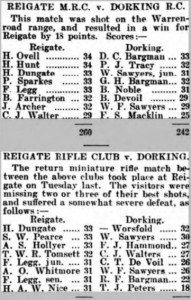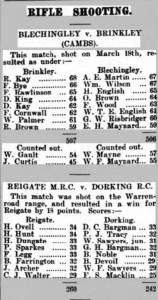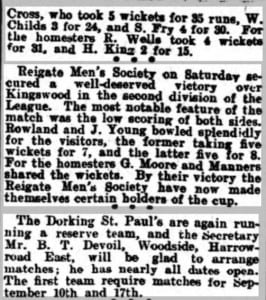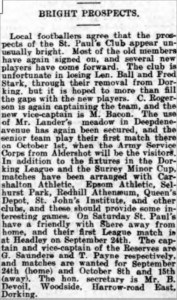
© Dorking Advertiser
find my past.co.uk

Thank you to Lorraine Spindler for the following research.
Benjamin was born in Brixton in 1889 and baptised on 27th July 1889 at Tulse Hill Holy Trinity church.
The 1911 census shows Benjamin living with his father Benjamin Snr and mother Henrietta Mark De Voil in Dorking at ‘Woodside’ in Harrow Road. Benjamin, aged 21, was the eldest of four siblings including Eustace Richard (14), Amy Edwina Alexandra (8) and Donald Harry (6). In 1911 Benjamin was working as a clerk at a corn merchants and his father was a domestic gardener. Benjamin Snr. had been married to Henrietta for twenty two years and in that time they had suffered the loss of four children. The Eastbourne Gazette records the death on 13 January 1902 of May De Voil aged ten years and nine months. Benjamin’s siblings were all at school. The family had moved around, as the census shows Benjamin senior was born in Hertfordshire, Henrietta was from Eastbourne, Benjamin Jnr had been born in Brixton, Eustace and Amy in Eastbourne and Donald in Dorking – suggesting that the family had lived in Dorking at least since 1905.
The DeVoil family were active members within the Dorking community; pre-war papers indicated that Benjamin Thomas DeVoil was the Hon. Secretary of the local St. Paul’s football club, suggesting he may also have been a player for the team. A Mr. B DeVoil is also shown as a member of Dorking Rifle Club which may account for his choice to join the Queen’s Westminster Rifles. Plus he is shown playing for the St Paul’s Chess Club.
Benjamin’s service number suggests he joined the Queen’s Westminster Rifles (QWR) in September 1914. The Dorking Roll of Honour reproduced in the Epsom District Times and County Post shows Benjamin had been posted to H Company of the 2nd Battalion QWR.
At the outbreak of war the QWR’s trained at Leverstock Green in Hertfordshire. Benjamin may well have joined as the QWR as a volunteer with the Territorial Army – their pre-war annual camp took place in Abergavenny in 1913. As a result of their training it the QWR was one of the few territorial regiments thought fit enough for overseas service at the outbreak of war in August 1914. However, Benjamin’s medal card indicated that he entered overseas military service in France on the 4th July 1915.
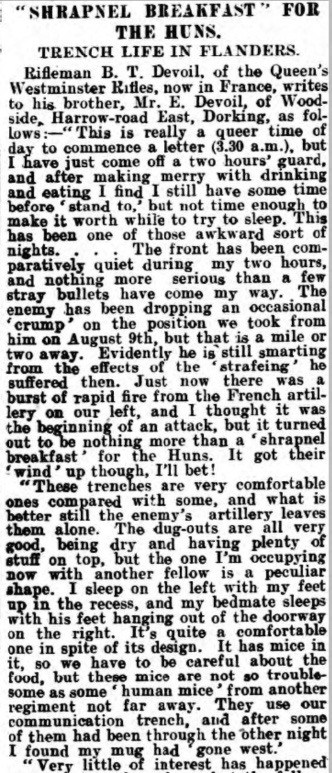
“Shrapnel Breakfast” for the Huns
Trench Life in Flanders
Rifleman B. T. Devoil of the Queen’s Westminster Rifles, now in France, writes to his brother, Mr. E. Devoil, of Woodside, Harrow Road, Dorking as follows:- “This is a really queer time of day to commence a letter (3.30am), but I have just come off a two hours guard, and after making merry with drinking and eating I find I still have some time before ‘stand to’ but not enough time to make it worth while to try to sleep. This has been one of those awkward sort of nights… The front has been comparatively quiet during my two hours, and nothing more serious than a few stray bullets have come my way. The enemy has been dropping an occasional ‘crump’ on the position we took from him on August 9th, but that is a mile or two away. Evidently he is still smarting from the effects of the ‘strafeing’ he suffered then. Just now there was a burst of rapid fire from the French artillery on our left, and I thought it was the beginning of an attack, but it turned out to be nothing more than a ‘shrapnel breakfast’ for the Huns. It got their ‘wind’ up though, I’ll bet!
“These trenches are very comfortable ones compared with some, and what is better still the enemy’s artillery leaves them alone. The dug-outs are all very good, being dry and having plenty of stuff on top, but the one I’m occupying now with another fellow is a peculiar shape. I sleep on the left with my feet up in the recess, and my bedmate sleeps with his feet hanging out of the doorway on the right. It’s quite a comfortable one in spite of its design. It has mice in it, so we have to be careful about the food, but these mice are not so troublesome as some ‘human mice’ from another regiment not far away. They use our communication trench, and after some of them had been through the other night I found my mug had ‘gone west’.
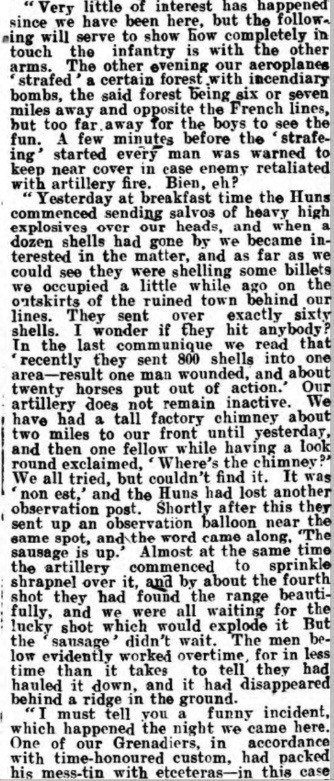
Very little of interest has happened since we have been here, but the following will serve to show how completely in touch the infantry is with other arms. The other evening our aeroplanes ‘strafed’ a certain forest with incendiary bombs, the said forest being six or seven miles away and opposite the French lines, but too far away for the boys to see the fun. A few minutes before the ‘strafeing’ started every man was warned to keep near cover in case enemy retaliated with artillery fire. Bien, eh?
Yesterday at breakfast time the Huns commenced sending salvos of heavy high explosives over our heads, and when a dozen shells had gone by we became interested in the matter, and as far as we could see they were shelling some billets we occupied a little while ago on the outskirts of the ruined town behind our lines. They sent over exactly sixty shells. I wonder if they hit anybody? In the last communique we read that ‘recently they sent 800 shells into one area – result one man injured, and about one twenty horses put out of action.’ Our artillery does not remain inactive. We had a tall factory chimney about two miles to our front until yesterday, and then one fellow while having a look round exclaimed ‘Where’s the chimney?’ We all tried but couldn’t find it. It was ‘non est,’ and the Huns had lost another observation post. Shortly after this they sent up an observation balloon near the same spot, and the word came along. ‘The sausage is up.’ Almost at the same time the artillery commenced to sprinkle shrapnel over it, and by about the fourth shot they had found the range beautifully, and we were all waiting for the luck shot that would explode it. But the ‘sausage’ didn’t wait. The men below evidently worked overtime, for in less time than it takes to tell they had hauled it down, and it had disappeared behind a ridge in the ground.
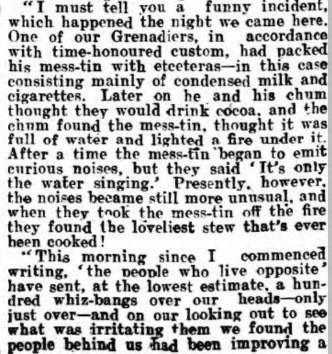
I must tell you a funny incident which happened the night we came here. One of our Grenadiers, in accordance with time-honoured custom had packed his mess-tin with etceteras – in this case consisting mainly of condensed milk and cigarettes. Later on he and his chum thought they would drink cocoa, and the chum found the mess-tin, thought it was full of water and lighted a fire under it. After a time the mess-tin began to emit curious noises, but they said ‘It’s only the water singing.’ Presently, however, the noises became more unusual, and when they took the mess-tin off the fire they found the loveliest stew that’s ever been cooked.
This morning since I commenced writing, ‘the people who live opposite’ have sent, at the lowest estimate, a hundred whizz-bangs over our heads – only just over – and on our looking out to see what was irritating them we found the people behind us had been improving ???
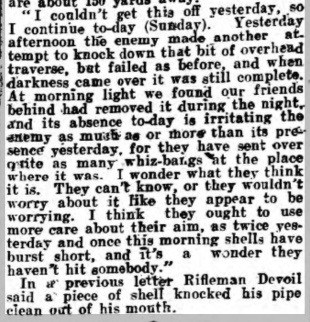
“I couldn’t get this off yesterday, so I continue today (Sunday). Yesterday afternoon the enemy made another attempt to knock down that bit of overhead traverse, but failed as before, and when darkness came over it was still complete. At morning light we found our friends behind had removed it during the night, and its absence today is irritating the enemy as much as or more than its presence yesterday, for they have sent over quite as many whizbangs at the place where it was. I wonder what they think it is. They can’t know or they wouldn’t worry about it like they appear to be worrying. I think they ought to use more care about their aim, as twice yesterday and once this morning shells have burst short, and it’s a wonder they haven’t hit somebody.”
In a previous letter Rifleman Devoil said a piece of shell knocked his pipe clean out of his mouth.
On 11th September 1915, some seven months after Benjamin’s arrival in France, the Dorking and Leatherhead Advertiser carried an article entitled “Shrapnel Breakfast” For the Huns – Trench Life in Flanders. The article was the reproduction of Benjamin’s letter to his eighteen year old brother Eustace.
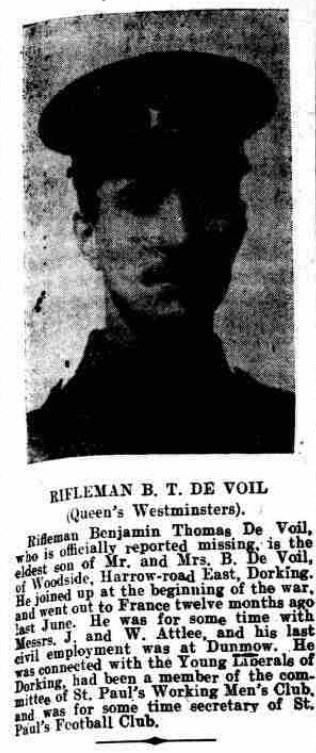
RIFLEMAN B.T. DE VOIL
(Queen’s Westminsters).
Rifleman Benjamin Thomas De Voil, who is officially reported missing, is the eldest son of Mr. and Mrs. B De Voil, of Woodside Harrow Road, East Road, East Dorking. He joined up at the beginning of the war and went out to France twelve months ago last June. He was for some time with Messrs J. and W. Attlee, and his last civil employment was at Dunmow. He was connected with the the Young Liberals of Dorking, had been a member of the committee of St. Paul’s Working Men’s Club, and was for some time secretary of St. Paul’s Football Club.
Benjamin DeVoil Missing Notice 29th July 1916 © Dorking Advertiser findmypast.co.uk
Benjamin was killed in action on the first day of the Battle of the Somme on 1st July 1916 and buried (plot IV.B.24) at Gommecourt Wood New Cemetery, Foncquevillers, France – he was twenty seven years old.
His medal card includes the comment ‘Death Pres. 1.7.16’ indicating that at first he was listed as missing in action. His body was later found and his grave marked. Benjamin qualified for the Star, Victory and British medals.
On 1st July 1916 the Queen’s Westminster Rifles stepped into No Man’s Land in the face of a curtain of German bullets from machine gun fire. Many of the German trenches were captured, but of the 750 officers and men who went over the top that day, 600 were killed, wounded or missing. There was so much smoke it would have been exceptionally difficult for Benjamin to make out their attack objectives and most of the Germans had withdrawn, but not before setting several traps in the dug outs.
Foncquevillers was in British hands in 1915 and 1916. On 1st July 1916, Benjamin took part in the attack on Gommecourt Wood and Village by the 46th (North Midland) Division and the 56th (London) Division. The attack was initially successful but could not be maintained and it reverted to a salient in the German line until 27nd February 1917 when the Germans evacuated the area. During the March 1918 German offensive the area was still part of the British front lines. Benjamin was buried in July 1916 as part of the battlefield clearance.
The war memorial in Great Dunmow, Essex also lists Benjamin’s name.
| Born | Brixton, London | |
| Lived | Dorking, Surrey | |
| Son of | Benjamin and Henrietta DeVoil of Woodside Harrow Road, Dorking | |
| Regiment | 16th London Regiment (Queen’s Westminster Rifles) | |
| Number | 550620 | |
| Date of Death | 1st July 1916 | |
| Place of Death | France | |
| Cause of Death | Killed in Action | |
| Age | 27 | |
| Cemetery | Gommecourt No. 2 Cemetery, Hebuterne, Somme, France |

